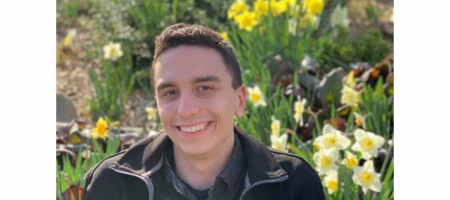Student Spotlight – Steven Bech
Meet UCLA undergraduate researcher Steven Bech!
Steven Bech majors in History and minors in Film, Television, Digital Media and is in our Undergraduate Research Scholars Program (URSP). The title of his project is “The Reactions of East and West Germany to the Cuban Missile Crisis of 1962.” His focus is to contribute to the historical narrative of the Cuban Missile Crisis by exploring the narratives of people from different strata and countries. His best piece of advice for those interested in research: Don’t be intimidated.
How did you first get interested in your research project?
As a community college transfer student, I knew I wanted to participate in the History Honors Program before I applied to UCLA. Once I have been accepted, I did not hesitate to fulfill all the necessary requirements to be able to participate in the program and seek out a faculty mentor who was willing to work with me on this project. After dozens of emails and office hours, I was fortunate enough to land in Professor Kevin Y. Kim’s class, a Cold War historian at UCLA. Knowing that I was interested in a research project about any recent conflicts of the twentieth century, including World War II and the Cold War, Professor Kim helped me to develop a topic that has not been explored yet in the existing Cold War scholarship—the reactions of East and West Germany to the Cuban Missile Crisis of 1962. As an international student from Germany, this particular topic immediately spoke to me as I would not only be able to rely on German primary sources to develop my thesis, but also learn about the upbringing of my parents during these turbulent years of the Cold War. Now, I could finally begin the research process.
What has been the most exciting aspect of your research so far?
What I truly love about my research is the fact that many of the sources that I incorporate in my thesis of this event that occurred in October 1962 are largely unknown to the greater public. I especially get lost in the littlest details that really allow me to put myself in the shoes of the people who lived through these uneasy times, allowing me to see the world through their eyes. Creating something entirely new and diving into a previously unexplored topic can be intimidating at times, but the experience itself and the knowledge acquired by the end of the project is worth the time and effort.
What has surprised you about your research or the research process?
Having worked on this research project for almost a year now, including archival research, I quickly gained an appreciation for the work historians do. When I read any history book today, I look at the words and phrases that the author wrote with great respect. Now that I understand how much work goes into the research and writing process and recognize how challenging it can be to put these puzzle pieces together to create a narrative that is not only true to its core but also entertaining to read, I truly admire those who dedicate their lives to share with the public what has previously been hidden or unknown.
What is one piece of advice you have for other UCLA students thinking about doing research?
The greatest piece of advice that I would like to share with the UCLA community and anyone who is interested in this endeavor is: Don’t be intimidated. In my case, the Cuban Missile Crisis is one of the most studied events in Cold War history, as hundreds of books and academic articles have been written about this international incident. Needless to say, I was enormously overwhelmed when I started out, also because I needed to deal with the challenges of conducting research during a worldwide pandemic. I cannot even count how many times I doubted myself and started to contemplate whether or not I made a mistake by signing up for this program. Fortunately, Professor Kim reassured me time and time again that it is only natural for historians to feel this way, encouraging me to keep going. With his help, I eventually found ways to effectively face this mountain of literature and scholarship and actually enjoy the research and writing process.
What effect do you hope your research has in your field, at UCLA, in your community, or in the world?
Beyond hoping to encourage other students to engage in the research process, I am hoping that my thesis will not only find a place in the existing scholarship and contribute to the historical narrative of the Cuban Missile Crisis, but also encourage other researchers to add to this ongoing conversation. With a primary focus on the key participants—the United States, Soviet Union, and Cuba—in the contemporary scholarship, there is so much more ground to cover from different angles that could significantly change how we view this military standoff. Being part of a new wave of historic scholarship that explores the narratives of people from different strata and countries, the story of the Cuban Missile Crisis is far from complete.


